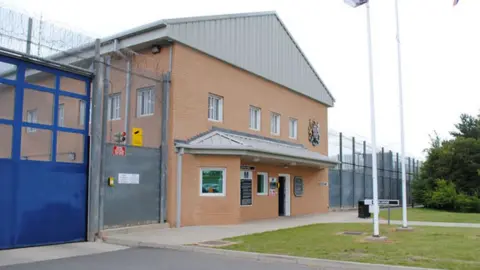Married transgender women in prison win legal battle over contact
 Other
OtherA married transgender couple have won a legal battle over contact in prison after a judge found their relationship had been reduced to "pen pals".
The pair met in HMP Whatton, Nottinghamshire, in 2015, marrying two years later.
Legal action was taken against Whatton, HMP Stafford and the Ministry of Justice after the couple were only allowed to communicate through letters.
A High Court judge said the restrictions were "disproportionate".
The 45-year-old who brought the claim was given an imprisonment for public protection (IPP) sentence in 2006 for sexual assault of a child under 13, with a minimum term of just over one year.
Her 32-year-old wife was also given an IPP in 2009 for possessing indecent images, with a minimum term set at 18 months.
HMP Whatton houses male prisoners convicted of sexual offences.
Soon after the pair married, the claimant said she was moved to a different prison without warning and given no chance to say goodbye to her wife.
After all contact was initially banned, the pair, who have not been named, were allowed to write letters to each other, but phone calls and visits remained prohibited.
Mr Justice Morris said the video links from their respective prisons during the case were the first times they had seen or heard each other in almost four years.
'No explanation'
Both prisons and the Ministry of Justice argued the couple posed a risk to each other and the wider community, and that the risk was too great to allow face-to-face or telephone contact.
However, in a judgement on Friday, Mr Morris said the restrictions were "unnecessary and disproportionate", adding there was a lack of "firm evidence" for putting them in place.
While acknowledging the ongoing risk the claimant provides and the "challenges for those entrusted with their care within prison", he said "no explanation" had been given for why the couple had been placed in separate prisons.
"It is not clear how restricting contact with the claimant is likely to reduce her ongoing sexual interest in children," he said.
"There is no evidence to suggest that it will."
The judge also awarded the claimant an unspecified amount in damages, finding she had suffered "substantial anxiety, frustration and distress" over the last few years.

Follow BBC East Midlands on Facebook, Twitter, or Instagram. Send your story ideas to [email protected].
